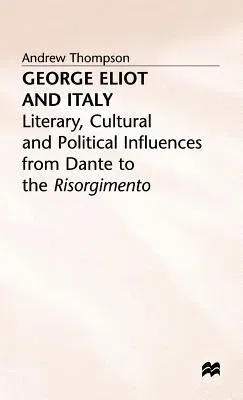A Thompson
(Author)George Eliot and Italy (1998)Hardcover - 1998, 15 December 1997

Qty
1
Turbo
Ships in 2 - 3 days
In Stock
Free Delivery
Cash on Delivery
15 Days
Free Returns
Secure Checkout

Part of Series
Literary, Cultural and Political Influences from Dante to th
Print Length
243 pages
Language
English
Publisher
Palgrave MacMillan
Date Published
15 Dec 1997
ISBN-10
0333694562
ISBN-13
9780333694565
Description
Product Details
Author:
Book Edition:
1998
Book Format:
Hardcover
Country of Origin:
US
Date Published:
15 December 1997
Dimensions:
21.59 x
13.97 x
1.91 cm
ISBN-10:
0333694562
ISBN-13:
9780333694565
Language:
English
Location:
London
Pages:
243
Publisher:
Weight:
471.74 gm